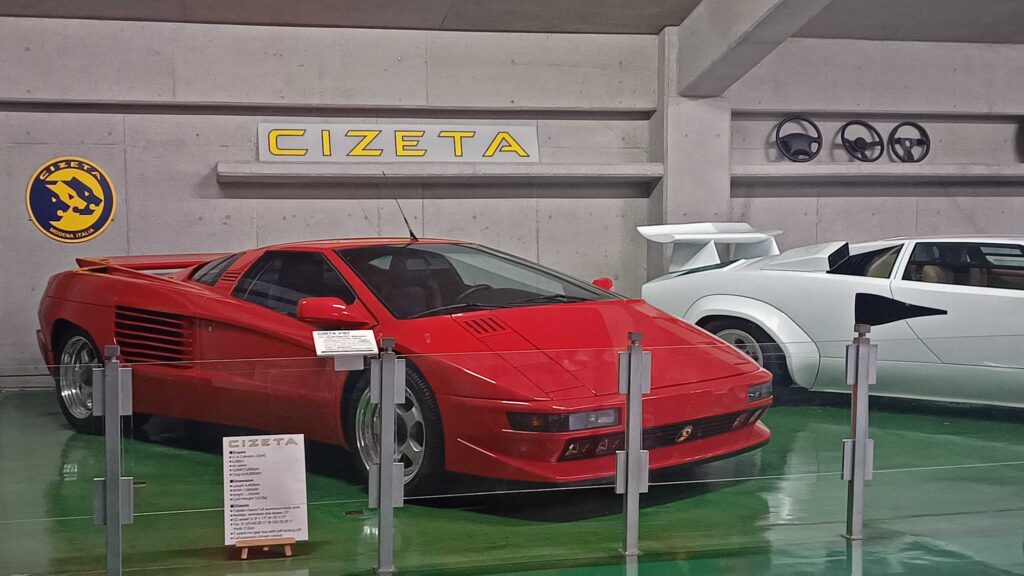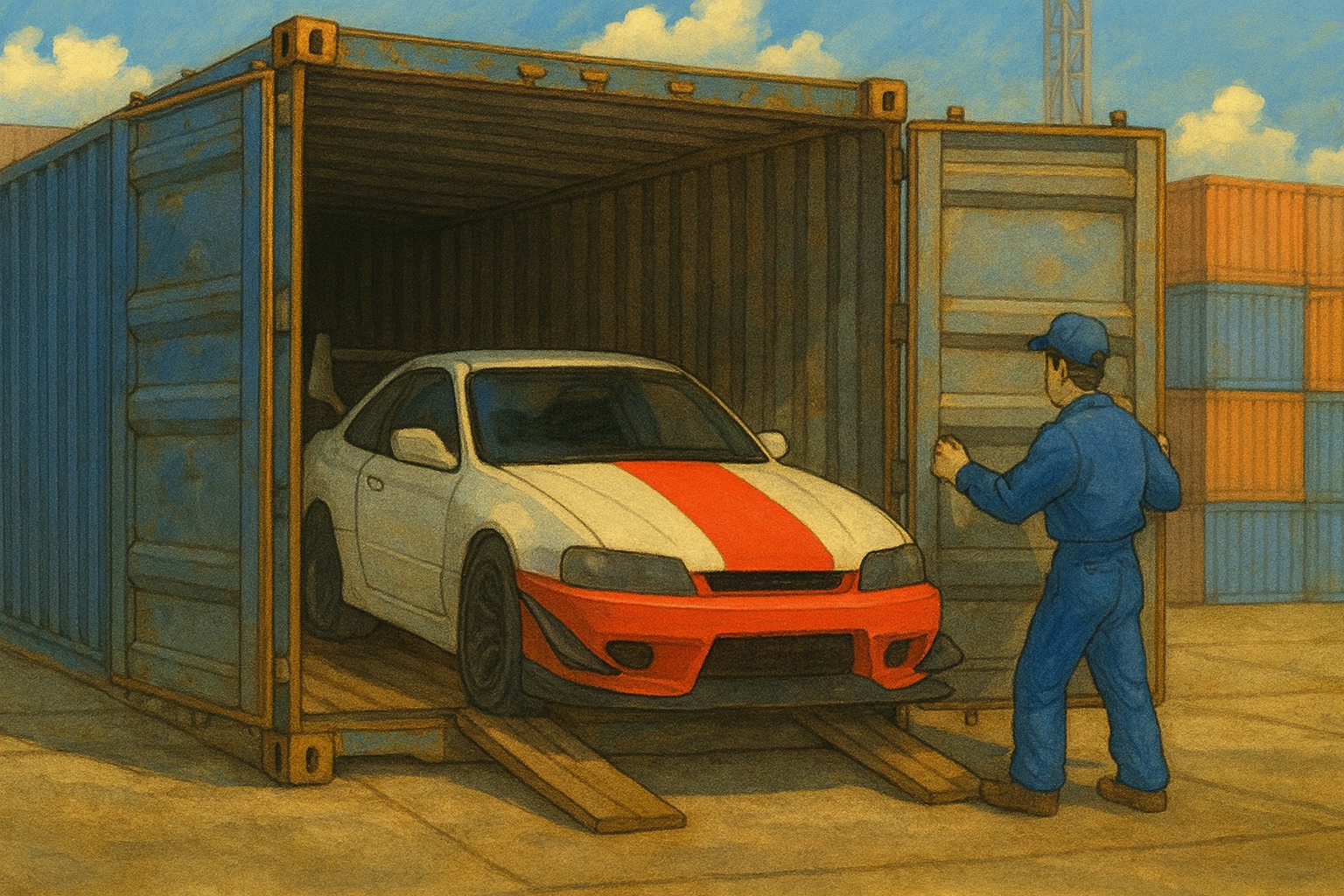Attack Tsukuba, one of Japan’s premier time attack events, has been gaining international attention in recent years. With foreign drivers setting impressive lap times, the event has become increasingly international, and enthusiasts from around the world dream of driving at the “holy ground” of Tsukuba. However, bringing your own vehicle to Japan for racing involves numerous challenges, from vehicle transportation to local preparation and support. As an international vehicle import/export professional company, Good Loop provides comprehensive support for this challenge. Below, we introduce the services required to participate in Attack Tsukuba (and other circuit driving events) from overseas.
Vehicle Transportation to Japan: Sea Transport vs. Air Transport
There are two main methods for transporting vehicles from overseas to Japan: sea transport (by ship) and air transport. Each method differs in time requirements and costs, with their own advantages and disadvantages. We arrange the optimal method according to our customers’ needs.
Sea Transport (Container Ships & RORO Ships): This is the most common cost-effective method. The voyage from Europe to Japan typically takes 3-6 weeks, and costs per vehicle can be reduced by shipping multiple vehicles together. For example, 3-4 passenger cars can be loaded into a 40-foot shipping container, allowing safe transport while sealed and protected from theft and damage. However, when shipping just one vehicle by container, costs become expensive, so we also consider container sharing with multiple vehicles or using car carrier ships (RORO ships) where vehicles can be driven on board.
Air Transport: This method is suitable for emergency situations or luxury car transport, characterized by dramatically faster delivery times of several days to one week. It’s effective when you need to send a race car at the last minute or want to use your vehicle locally until just before bringing it to Japan for an event. However, costs are extremely high – while sea transport costs tens of thousands of dollars, air freight often exceeds $100,000, and there are size and weight restrictions. For customers requiring air freight, we provide detailed quotes and procedures in advance, offering this as an option to “buy time with money.”
For temporarily importing vehicles to Japan, the following methods are available:
ATA Carnet (Admission Temporaire – Temporary Admission Carnet) This is customs documentation used for exhibitions and business meetings, issued in Japan by the Japan Commercial Arbitration Association (JCAA). For importing race cars for motorsport events like Attack Tsukuba or shows, ATA Carnet is the most common method. It allows temporary use without taxes or customs duties for a certain period (usually within one year), with the condition that the vehicle be re-exported after the event.
CPD Carnet (Carnet de Passage en Douane) This system is for temporarily importing personal vehicles to foreign countries, issued in Japan by JAF (Japan Automobile Federation). It’s commonly used when tourists want to drive on Japanese public roads with their home country license plates.
Regular Customs Temporary Import Application As an alternative to using carnets, it’s possible to apply for “temporary import permission” with customs. In this case, customs duties and consumption tax are paid upon import and refunded upon re-export. This method becomes a practical option for vehicles from countries where carnets are not available or under special circumstances.
Temporary Import via International Ferry Vehicles temporarily imported on ferries between Japan and foreign countries can go through tax-free customs procedures using the Automobile Temporary Import/Export Declaration Form (C5014), separate from carnets.
Regardless of which method you choose, we support procedures in partnership with reliable logistics and customs partners. We provide comprehensive guidance from preparing necessary documents (invoices, cargo manifests, bills of lading, etc.) to customs declarations and period management.
Vehicle Storage Services in Japan
After arrival in Japan, securing vehicle storage is important during the period until the event day, or if you want to leave your vehicle in Japan for a while after the event to enjoy sightseeing and driving. We provide vehicle storage at partnered garages with excellent security. Indoor storage prevents theft and vandalism, and we also provide condition maintenance measures such as battery maintenance, periodic engine starting, and covering as needed. We can accommodate long-term storage, meeting requests like “I want to leave my car in Japan after this year’s Attack Tsukuba participation to join events and driving sessions again next year and beyond.”
Vehicle Setup and Maintenance Support
To perform your best at Japanese circuits, on-site vehicle setup is essential. We partner with maintenance facilities and tuning shops to support maintenance and setting adjustments before and after driving. We can handle everything from basic services like oil and coolant changes to suspension setting modifications, tire replacement and procurement, and brake pad spare inventory.
Tsukuba Circuit is a technical 2,045-meter course, and aspects like corner exit-focused settings and adaptation to Japanese road surface grip characteristics require local knowledge. We have networks with mechanics and engineers with extensive Tsukuba driving experience and can introduce on-site support staff for race day when needed.
Arranging Visits to Famous Japanese Tuning Shops
We also mediate tuning and maintenance requests at coveted JDM tuning shops. For example, we flexibly respond to requests like “I want to fine-tune ECU settings during my stay in Japan” or “I want a famous shop’s craftsman to perform alignment adjustments.” Leave specialized terminology interpretation and negotiations to us. However, please note that famous shops are often booked far in advance.
Automotive Manufacturer & Private Collection Museum Tours
Japan has a rich automotive culture with attractive automotive museums throughout the country. Famous manufacturer-operated museums include Toyota Automobile Museum (Nagakute City, Aichi), Nissan Heritage Collection (by appointment, Zama City, Kanagawa), Suzuki History Museum (by appointment, Shizuoka), and Honda Collection Hall (within Twin Ring Motegi, Tochigi). Honda Collection Hall in particular displays numerous legendary cars and racing machines, making it a holy site not only for Honda fans but for all motorsport enthusiasts. Other facilities include Mazda Museum at Mazda headquarters (by appointment, Hiroshima) and Yamaha Motor Communication Plaza (Shizuoka), each offering impressive manufacturer-specific exhibits.
Meanwhile, museums opened by passionate private collectors are scattered throughout the country. For example, Japan Automobile Museum in Ishikawa Prefecture is the largest in Japan, housing about 500 precious classic cars including the Toyota 2000GT and Jaguar XK140. Other famous venues include Kawaguchiko Motor Museum (Harada Collection, open only in August, displaying the Cizeta V16T), GLION MUSEUM in Osaka, Iwashita Collection in Oita (displaying the world’s only L-type 4-cylinder Ducati Apollo), and Nasu Classic Car Museum in Tochigi.

We also plan museum tour itineraries according to our customers’ interests. If you’re wondering “I definitely want to visit these museums during my stay in Japan, but I don’t know about access methods or reservations,” don’t worry. For example, Nissan Heritage Collection requires complete advance reservations, but we handle booking procedures and arrange English-language tour guidance. For customers coming from overseas, visiting these museums to directly experience Japanese automotive culture will be an unforgettable experience.
“Street Racing” Spot Tours: Daikoku PA, Hakone Turnpike, and More
An essential part of Japanese car scene culture is pilgrimage to street-origin holy sites. The representative location is Daikoku Futo Parking Area (Daikoku PA). Located on an artificial island under the elevated Shuto Expressway Bayshore Route, this PA becomes one of the world’s premier car meeting spots at night, with countless modified cars and supercars gathering. Combined with the unique landscape surrounded by spiral highway ramps, Daikoku PA is considered a microcosm of Japanese car culture.
Popular suburban driving courses outside the metropolitan area are also popular. Particularly famous is Hakone Turnpike in Kanagawa Prefecture (currently the toll road to MAZDA Sky Lounge), renowned as one of Japan’s premier winding roads. The succession of smooth high-speed corners with views of Mount Fuji is exceptional, sometimes called “Japan’s mini-Nürburgring.” How about departing Tokyo early morning for a drive to the Mount Fuji foothills, incorporating hot springs and sightseeing along the way?
We arrange street racing spot tours throughout Japan according to your preferences. Enjoy memorable car culture experiences.
Travel Support During Your Stay (Information Provision)
Beyond vehicle-related services, we provide free information and advice to help customers enjoy Japan with peace of mind during their stay. By introducing reliable external services and official booking sites, we help make your trip smooth.
Accommodation Guidance We introduce hotels near circuits, urban accommodations, hot spring inns, etc., free of charge. Actual bookings are made by customers themselves.
Rental Car and Transportation Information We introduce vehicle types available with international licenses and popular vehicle classes among circuit participants.
Sightseeing and Dining Spot Advice We introduce worthwhile tourist destinations and restaurants in the Tsukuba area and metropolitan region based on staff experience and reviews.
Interpreter and Support Service Introductions When specialized interpretation or guides are needed, we introduce reliable external partners.
While we cannot provide travel services directly, we provide extensive support in the form of “information provision” to help overseas customers enjoy their stay in Japan more comfortably.
Why Good Loop is Chosen: Reliable Partnerships and Flexible Response
Partnership with Reliable Partners: We partner with trusted specialists in international logistics, maintenance, tourism, and other fields to provide services tailored to customer needs. For import/export procedures and transportation, we team up with experienced logistics companies to establish reliable and safe support systems.
One-Stop & Custom Solutions: The ability to provide integrated guidance from transportation and storage to setup and tourism support is a unique feature of Good Loop. Since each customer’s situation differs, we flexibly customize to realize “your own special plan.”
Transparency and Cost Consideration: We provide clear itemized estimates and propose optimal plans that eliminate unnecessary costs. For example, cost savings are possible through container sharing with multiple vehicles or taking advantage of off-season discount routes.
Passionate Support: Good Loop considers ourselves fellow automotive and motorsport enthusiasts who want to support our customers’ challenges. We carefully attend to each case, striving to create experiences that make you think “I’m glad I came.”
The experience of traveling across borders with your car will become a once-in-a-lifetime memory. Good Loop will provide full support toward realizing this dream. For everyone considering participating in Attack Tsukuba, please feel free to contact us. Let’s aim together for the best time etched into Course 2000 at Tsukuba Circuit!

